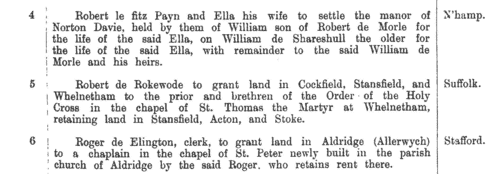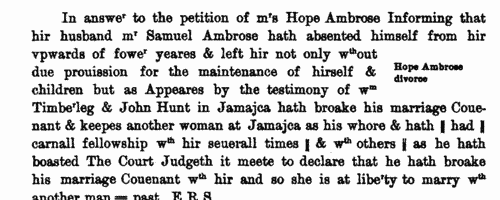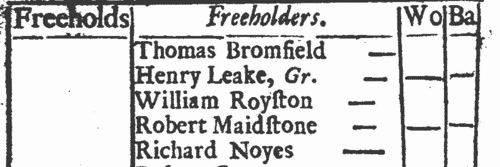Edy Surname Ancestry ResultsOur indexes 1000-1999 include entries for the spelling 'edy'. In the period you have requested, we have the following 50 records (displaying 1 to 10): Single Surname Subscription | | | Buying all 50 results of this search individually would cost £314.00. But you can have free access to all 50 records for a year, to view, to save and print, for £100. Save £214.00. More... |
These sample scans are from the original record. You will get scans of the full pages or articles where the surname you searched for has been found. Your web browser may prevent the sample windows from opening; in this case please change your browser settings to allow pop-up windows from this site. Close Rolls
(1429-1435)
The close rolls of the 8th to 13th years of the reign of king Henry VI record the main artery of government administration in England, the orders sent out day by day to individual officers, especially sheriffs of shires: they are an exceptionally rich source for so early a period. There is also some material relating to Wales, Scotland, Ireland and the English possessions in France. Also included is the Exchange Roll of 1424 to 1434, of licences to transmit sums of money out of the realm.EDY. Cost: £4.00.  | Sample scan, click to enlarge

| Close Rolls
(1441-1447)
The close rolls of the 20th to 25th years of the reign of king Henry VI record the main artery of government administration in England, the orders sent out day by day to individual officers, especially sheriffs of shires: they are an exceptionally rich source for so early a period. There is also some material relating to Wales, Scotland, Ireland and the English possessions in France. EDY. Cost: £4.00.  | Sample scan, click to enlarge

| Close Rolls
(1447-1454)
The close rolls of the 26th to 32nd years of the reign of king Henry VI record the main artery of government administration in England, the orders sent out day by day to individual officers, especially sheriffs of shires: they are an exceptionally rich source for so early a period. There is also some material relating to Wales, Scotland, Ireland and the English possessions in France. EDY. Cost: £4.00.  | Sample scan, click to enlarge

| Landowners and tenants in Buckinghamshire
(1345-1485)
Inquisitions ad quod damnum were held by the appropriate sheriff or escheator (or other officer in whose bailiwick the matter in question might lie) to investigate cases in which the royal or public interest might be damaged by proposed alienation or settlement of land (especially alienation to religious uses, into mortmain). The key findings from these inquisitions were as to the tenure of the land and the service due from it; its yearly value; the lands remaining to the grantor, and whether they sufficed to discharge all duties and customs due from him; and whether he can still be put upon juries, assizes and recognitions, so that the country be not burdened by his withdrawal from them. Generally speaking, this process had the makings of a system of licensing such alienations, and raising money in proportion to the valuations. Equally, there are many items that deal with subjects such as the closing of public roads, the felling or inclosing of woods, or the proposed grant of liberties or immunities. A calendar of these inquisitions from the 19th year of the reign of king Edward III to the 2nd year of Richard III was prepared by the Public Record Office and published in 1906. We have now indexed this calendar by surname and county. Most of the individuals appearing in the calendar are either pious individuals seeking to make grants to religious bodies for the sake of their souls; or landowners securing the disposition and settling of their real estate. But some other names do appear - tenants, trustees, chaplains and clerks.EDY. Cost: £6.00.  | Sample scan, click to enlarge

| Tenants, founders and incumbents of Yorkshire chantries
(1546-1548)
Chantries were established to perform services for the souls of their founders and other faithful dead, including annual obits and anniversaries at which alms were usually distributed. The chantries could be at an existing altar in a parish church, a new altar in a side chapel of an existing church, in a new chapel in the churchyard or some miles from an existing church: few were founded before 1300, and most date from 1450 to 1500. Hospitals were places provided by similar foundations to receive the poor and weak; there were also religious guilds, brotherhoods and fraternities, and colleges (like large chantries at which three or more secular priests lived in common). An Act of Parliament of 1545 gave king Henry VIII the power to dissolve such chantries, chapels, &c., the proceeds to be devoted to the expenses of the wars in France and Scotland. Commissioners were appointed 14 February 1546 to survey the chantries and seize their property, and from 1546 to 1548 the commissioners produced these certificates giving brief details of the establishment and nature of each foundation, with an inventory of valuables and rental of lands. The individuals named in the certificates are thus the founder, the present incumbent, and the tenants whose rents provided the chantry's income. All the surviving certificates were edited by William Page for the Surtees Society, and published from 1892.EDY. Cost: £6.00.  | Sample scan, click to enlarge

| Massachusetts Criminals, Litigants, Lawyers and Jurors
(1673-1692)
The only surviving complete volume of the records of the courts held by the Governor and Assistants of the Colony of the Massachusetts Bay is for the period 1673 to 1692. It was transcribed by John Noble, and published by order of the Board of Aldermen of the City of Boston, New England, as County Commissioners of the County of Suffolk, Massachusetts. Under English law overseas colonies were generally deemed to fall under the jurisdiction of the Admiralty, and were subject to English law varied by local circumstances. These Courts of Assistants therefore also function as Courts of Admiralty; the courts had jurisiction over criminal cases and also in civil disputes between parties. In practice, many of the names that occur in the record are just those of the members of the grand jury and the lesser juries (appointed from among the adult male householders of the colony) before whom the cases were tried.EDY. Cost: £4.00.  | Sample scan, click to enlarge

| Allegations for marriages in southern England
(1687-1694)
The province or archbishopric of Canterbury covered all England and Wales except for the northern counties in the four dioceses of the archbishopric of York (York, Durham, Chester and Carlisle). Marriage licences were generally issued by the local dioceses, but above them was the jurisdiction of the archbishop, exercised through his vicar-general. Where the prospective bride and groom were from different dioceses it would be expected that they obtain a licence from the archbishop; in practice, the archbishop residing at Lambeth, and the actual offices of the province being in London, which was itself split into myriad ecclesiastical jurisdictions, and spilled into adjoining dioceses, this facility was particularly resorted to by couples from London and the home counties, although there are quite a few entries referring to parties from further afield. The abstracts of the allegations given here usually state name, address (street in London, or parish), age, and condition of bride and groom; and sometimes the name, address and occupation of the friend or relative filing the allegation. Where parental consent was necessary, a mother's or father's name may be given. The ages shown should be treated with caution; ages above 21 tended to be reduced, doubtless for cosmetic reasons; ages under 21 tended to be increased, particularly to avoid requiring parental consent; a simple statement 'aged 21' may merely mean 'of full age' and indicate any age from 21 upwards. These are merely allegations to obtain licences; although nearly all will have resulted in the issuing of the licence, many licences did not then result in marriage. EDY. Cost: £4.00.  | Sample scan, click to enlarge

| Freeholders of Northall in Middlesex
(1705)
This 'Exact List of the Poll At the Chusing of Knights of the Shire for the County of Middlesex, Taken at New-Brentford, on Monday the 28th of May, 1705' lists all the freeholders eligible to vote, parish by parish, with an indication on the righthand side whether each voted for Sir John Wolstenholme, baronet, (Wo) or Score Barker, esquire, (Ba), or not at all. Those qualified to vote were men of full age (over 21) in possession of a freehold estate worth 40s a year or more.EDY. Cost: £6.00.  | Sample scan, click to enlarge

|  Apprentices registered at Chatham in Kent
(1710-1712) Apprentices registered at Chatham in Kent
(1710-1712)
Apprenticeship indentures and clerks' articles were subject to a 6d or 12d per pound stamp duty: the registers of the payments usually give the master's trade, address, and occupation, and the apprentice's father's name and address, as well as details of the date and length of the apprenticeship. There are central registers for collections of the stamp duty in London, as well as returns from collectors in the provinces. These collectors generally received duty just from their own county, but sometimes from further afield. May 1710 to January 1712. (The sample entry shown on this scan is taken from a Shropshire return)EDY. Cost: £8.00.  | Sample scan, click to enlarge

|  Apprentices registered at Chatham in Kent
(1712-1713) Apprentices registered at Chatham in Kent
(1712-1713)
Apprenticeship indentures and clerks' articles were subject to a 6d or 12d per pound stamp duty: the registers of the payments usually give the master's trade, address, and occupation, and the apprentice's father's name and address, as well as details of the date and length of the apprenticeship. There are central registers for collections of the stamp duty in London, as well as returns from collectors in the provinces. These collectors generally received duty just from their own county, but sometimes from further afield. January 1712 to June 1713. (The sample entry shown on this scan is taken from a Norfolk return)EDY. Cost: £8.00.  | Sample scan, click to enlarge

|
Research your ancestry, family history, genealogy and one-name study by direct access to original records and archives indexed by surname.
|













